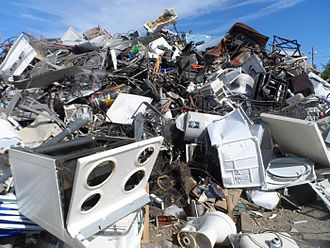
Back صفر نفايات Arabic Ҡалдыҡһыҙ технология Bashkir Нулеви отпадъци Bulgarian Residu zero Catalan Zero waste Czech Zero Waste German Senrubeco Esperanto Residuo cero Spanish Zero zabor Basque Zero waste Finnish

Zero waste, or waste minimization, is a set of principles focused on waste prevention that encourages redesigning resource life cycles so that all products are repurposed (i.e. “up-cycled”) and/or reused. The goal of the movement is to avoid sending trash to landfills, incinerators, oceans, or any other part of the environment. Currently 9% of global plastic is recycled.[1] In a zero waste system, all materials are reused until the optimum level of consumption is reached.
Zero waste refers to waste prevention as opposed to end-of-pipe waste management.[2] It is a “whole systems” approach that aims for a massive change in the way materials flow through society, resulting in no waste.[2] Zero waste encompasses more than eliminating waste through reducing, reusing, and recycling. It focuses on restructuring distribution and production systems to reduce waste.[3] Zero waste provides guidelines for continually working towards eliminating waste.[2]
According to the Zero Waste International Alliance (ZWIA), Zero Waster is the conservation of all resources by means of responsible production, consumption, reuse and, recovery of all products, packaging, and materials, without burning them and without discharges to land, water, or air that threaten the environment or human health.
Advocates expect that government regulation is needed to influence industrial choices over product and packaging design, manufacturing processes, and material selection.[4]
Advocates say eliminating waste decreases pollution and can also reduce costs due to the reduced need for raw materials.
- ^ "Plastic pollution is growing relentlessly as waste management and recycling fall short, says OECD". www.oecd.org. Retrieved 2022-10-21.
- ^ a b c Snow, W.; Dickinson J. (2001). "The end of waste: Zero waste by 2020" (PDF). Archived from the original (PDF) on 2017-10-30. Retrieved 2014-04-02.
- ^ Davidson, G. (2011). "Waste Management Practices: Literature Review" (PDF). Archived from the original (PDF) on 2012-02-01. Retrieved 2017-09-19.
- ^ Townsend, W. K. (2010). "Zero waste: an aspiration or an oxymoron?". Waste Management & Research. 28 (1): 1–3. doi:10.1177/0734242X09356145. PMID 20065044. S2CID 209360875.
© MMXXIII Rich X Search. We shall prevail. All rights reserved. Rich X Search